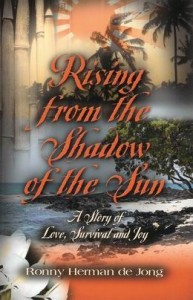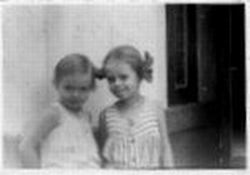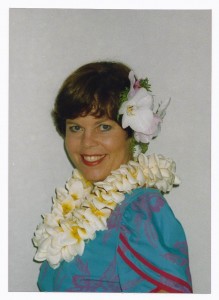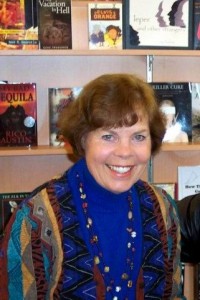I’m pleased to introduce this month’s guest, Ronny Herman de Jong, whom I met through the wide net of social media. Ronny has a particularly unique history that I thought would fit nicely here at And So It Goes. First, her bio.
Ronny Herman de Jong, a member of the Society of Southwestern Authors and the Professional Writers of Prescott with a BA in English Literature from Leiden University in the Netherlands, the author of two books and featured in a 2013 Anthology, is a survivor of the World War Two Japanese concentration camps in Asia.
Now her fascinating story
***
I was born on the island of Java in the Dutch East Indies, a tropical island empire nicknamed “The Emerald Girdle.” My father was a pilot with the Dutch Naval Air Force, based in Surabaya.
I learned Malay from our servants and the official Bahasa Indonesia in school. We had a cook, “Kokki”, a baboe to do the laundry and clean the house, and a boy for gardening. The tiled bathroom contained a large, square, deep basin with cold water and a dip bucket, with which we had to shower ourselves. The WC was outside the main house in the breezeway.
From the time I was three until almost seven I suffered with my mother and little sister under the brutal regime of the Japanese in concentration camps where they slowly tried to exterminate us by withholding food and medication after they had confiscated all our possessions. You can read all that in my book, Rising From the Shadow of the Sun.

After the war I grew up among Dutch, Indonesian, Chinese, and Indos (European/Dutch), all with their own language, religion and culture. It was a peaceful co-existence. People respected each other’s religions. My Chinese fellow students were always the smartest, and the best in math and science.

On Sundays Kokki made rijsttafel, a delicious, spicy Indonesian meal consisting of rice and vegetables with about twelve side dishes. Indonesians eat with their right hand, but I learned early in life to manipulate fork, spoon and knife according to proper European etiquette. We always took a nap after lunch, kids and adults alike; we played in the street with friends and in later years did our homework in the afternoon.
Because of the political unrest after the war we stayed close to home and I didn’t see the beauty of the countryside until I drove through Java and Bali in 1993. I loved the green terraced rice fields, the misty highlands, the age-old Hindu and Buddhist temples. Along country roads we stopped to hand out gifts to children while a crowd gathered around us. When I talked to them in Malay, they knew instantly we were Belandas (Dutch) and responded with happy greetings.
In Holland, where I went to college, I found people to be reserved. Dutch cheese, stroopwafels, croquettes and French fries with mayonnaise became my favorite snacks. For a year I commuted from Leiden to The Hague on my bike for evening classes in Greek and Latin, a distance of about 14 miles. A bike got you everywhere, and in those days biking on your own was still safe. One summer I bicycled through Holland, loving the flowers, the green-ness of the meadows, the smell of manure, laundry flapping in the wind at every thatched-roofed farm house, the waterways with quaint bridges, cobblestones in small towns, crow-stepped gables and trams for public transportation in the cities. The countryside is flat and everyone spoke Dutch!
A totally different world awaited my husband and me during a business training program in New York. The Statue of Liberty, the skyscrapers, the Broadway shows, the subways, were so amazing! A secretary in Rockefeller Plaza, I went to work dressed like I would go to a party in Holland. Posh! New horizons beckoned after a year and we trucked all our belongings from the east coast to the west coast in an old Plymouth station wagon we had purchased from a friend. We crossed majestic countryside, mountains and deserts, prairies and vast Indian reservations. When we went back to Holland I vowed that one day I would return and become a United States citizen.
Ten years later we moved from Holland to California with three kids and a dog. We enjoyed the wonderful climate, mountains and ocean, Mexican food and customs. Spanish was taught in the schools as a second language, and our kids learned English! Because we were totally unbiased as far as races was concerned, our children had no problem integrating into the school system with a minority of Caucasian students and the rest African American, Asian, and Latino.
Early retirement took us to the Big Island of Hawai’i, Hilo side, where it rains almost every day. Tropical rain forests and sugar cane fields, bountiful flowers, delicate fragrances and brown-skinned people reminded me of my childhood. What a wonderful world!
As a shock came the realization that the island was full of Japanese! I felt reserved and anxious as I remembered the cruelty of the Japanese I had experienced as a child. Not until we joined a little church up the coast did we discover that these Japanese, most of them retired sugar workers, were Japanese Americans, many of whom had fought in the 442nd Infantry Regiment in Europe during World War Two, and among the friendliest people we ever met.
Soon we adjusted from the hectic life in the big city to the laid-back, sharing way of life in Paradise with its underwater treasures of the ocean, the paniolos (Hawaiian cowboys) on the plains in the north, and the active volcano Kilauea from where Goddess Pele still keeps pushing her molten lava out and down to the ocean.

We immersed ourselves in the Hawaiian culture and after a couple of years I joined a Halau, a hula school, where I learned the art of dancing hula and some of the Hawaiian language. Hawaiian food is bland, but I learned to eat poi with the two fingers of my right hand!
I visited other Hawaiian Islands and experienced the special, deep spirituality of the former leper colony on the Kalaupapa peninsula of Moloka’i, where I stayed for a whole weekend in 1998. Kalaupapa is now a national park, accessible only by a bus tour. On Palm Sunday in Siloama Church, dating back to the days of Father Damien, I sang He Nani No “How Great Thou Art” together with a few of the remaining resident-patients. One of them sang harmony and it moved me to tears.
Currently Arizona, with its own culture and beauty of mountains, canyons, deserts and Indian ruins, is my home. I have never been able to learn the Navajo language, but that is no surprise! The Navajo Code Talkers helped end WWII with their undecipherable code and saved my life.
Because I grew up in such a melting pot of races, cultures and languages, all peacefully coexisting (except during the Japanese occupation), I always felt that people everywhere I lived were essentially sociable, except perhaps in Holland, where they were reserved and set in their ways. I could adjust to different climates, customs, food and languages easily, and I believe that when you want a friend, be a friend.
***
Here are the various links for contacting Ronny
Her book is available from Amazon.com
And here is a gripping YouTube Book trailer
Then, I hope you’ll join our conversation here.
Ronny, thank you so much for joining us here this week and sharing your story with us. Your story emphasizes to me both the resilience of the human spirit and the power of forgiveness.
Your first book, From the Shadow of the Sun, was published in 1992 and was based on the secret journal that your mother kept while in the prison camp. Do you have any plans to bring it back to print?


Marian Beaman
Ronnie’s story is gripping–surviving a Japanese concentration camp! Writing is in your genes, Ronnie, with a secret diary your mother kept while under such duress.
When I watched the trailer it struck me that this story could be made into a movie with scenes from all over the world. Thank you, Janet, for featuring such an inspiring story today. You and Ronnie certainly have a multi-cultural viewpoint in common.
Ronny Herman de Jong
Thank you Janet, I feel honored to be a guest on your blog. To answer your question: when my first book was published, in 1992, there was no internet and e-publishing yet. So my story only reached a limited market. But because it is so important for people to know about the women and children’s camps I decided to make it the first part of my second book. So the whole story of “In the Shadow of the Sun” is now Part One of my new book.
Janet Givens
I’m so glad to know there is a way for people to still read your mother’s story. The piece I most resonated with was that moment when you first moved to Hawaii and realized you were surrounded by Japanese people. How very frightening for you that must have been. Yet you stayed put, and in time allowed yourself to see them for who they were, as people, human beings, and not what they represented to you from so long ago. That’s not easy for many people.
I’m so glad we can share your story, here.
Ronny Herman de Jong
Hello Marian,
Yes, in reality, my mother was the author of my first book, and part of my second. The story of the camps was Her story. I merely translated the journal and had it edited.
It is amazing to me to see God’s direction in my life: Instead of going to Med School, which is what my father wanted for me, I studied English and benefited because I moved to the United States and I could later translate my mother’s diary and write books and stories.
I took a secretarial course which prepared me for secretarial positions with NASA and Hospice of Hilo and made me a good editor.
I went to acting school and learned to deeply listen – that prepared me for the time I would be a Hospice patient-care volunteer.
And so it went…my life around the world, always interesting, always busy.
And I love the name my father gave me: Ronny. He wanted a son, but when that did not happen he named me Ronny anyway. And my mother smiled and often called me Ronnetje.
Janet Givens
Hi Marian, Yes indeed; when I first met Ronnie on the We Love Memoirs FB group, I knew I needed her story on my blog. We’ve been in touch ever since. You are another one, particularly now with Ukraine so central to our everyday news. We should talk.
Ronny Herman de Jong
Well, Marian, this morning I wrote a long comment in response to yours. I don’t see it in the thread.
Janet, does that mean it was too long? Or that it was not good?
Ronny Herman de Jong
Ah, I see it now…It is awaiting moderation…
Janet Givens
Not sure what happened, Ronny. I was on my phone, so it’s possible my finger hit the wrong line. But here is your reply to Marian, in its entirety. I apologize for any discomfort.
Ronny Herman de Jong
Thanks Janet. My fingers constantly struggle with the small print on those tiny phones.
Shirley Hershey Showalter
I agree with Marian. What an amazing tale. Enjoyed watching the book trailer also. Oh, and I love the title of this blog post. It would be a good book title, also. Thank you for sharing your story, Ronnie, and thank you, Janet, for bringing Ronnie as a visitor.
Ronny Herman de Jong
Hmm, you gave me an idea Shirley. Perhaps I could write another book with that title
Janet Givens
Great idea. I second it.
Janet Givens
And thank you, Shirley, for stopping by. I always appreciate your visits. Next time, we’ll have tea.
Linda Austin
This is so interesting to me! Ronny, I am half Dutch and half Japanese, my mother surviving WWII in Japan as a teen. I wrote and published her story since so few know what it was like for Japanese civilians. I must read your story of survival, too, and so sorry to hear about yet more horrors of the War.
My father is second generation Dutch of “Dutch Chicago,” where a great many Dutch settled. While I know much about the Japanese culture, I know so little about Dutch culture, so interesting to read your take on it. I have not visited Japan or Holland, but someday… And Ronny, if you ever go to Japan, the people will be very polite and friendly – from what my friends say about their visits and lives there. The Japanese people were even friendly and helpful to the Occupation soldiers. I really enjoyed hearing about your experiences – thank you, Janet, for hosting Ronny.
Janet Givens
Linda, I’m so glad you found us. You’ve given rise to a new tag line for my website … making the world a little smaller, one blog post at a time. What do you think? Cheers. And thank you.
Ronny Herman de Jong
Hello Linda,
Wat an interesting background you have, too. I am glad that your mother lived away from where the bombs were dropped and survived. I was in Japan once, at the invitation of a Japanese journalist, born in 1951, who interviewed me about my book and wrote an article about in in the Hokkaido Shimbun Press. He knew nothing about my subject, but guess what? When I sang the song for him that I remembered we had to sing in camp, he could not make much of it, but said he would ask his father. And a month later, he faxed me the real words to the song. Yes, the people were very friendly, and I have no hard feelings. I only wish that the government would offer an apology to all the survivors who still struggle with their horrible memories.
Anyway, when thou read my book you will find day-to-day living experiences of the Dutch on Java before the war and during the war. I would love a review on Amazon from your unique perspective. What is your book called? Are your parents still alive?
What an interesting people I have met on your blog Janet. Thank you for this opportunity.
Janet Givens
Ronnie, Thank you for joining us here this week and sharing your story. I too look forward to this new book. Do keep us posted.
Ronny Herman de Jong
Ah, Janet, so many stories, so little time! Thank you again for posting my story on your interesting blog.